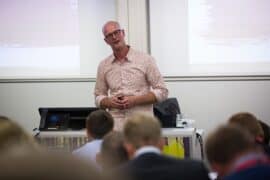The Lavin Agency Speakers Bureau
A speakers bureau that represents the best original thinkers,
writers, and doers for speaking engagements.
A speakers bureau that represents the best original thinkers,
writers, and doers for speaking engagements.
The world has changed overnight. Learn the science-based blueprint for how to change with it.
If the last few years have taught us anything, it’s how vital it is to adapt. But why is change so hard? And how can we diagnose complacency and conquer our goals? Award-winning behavioral scientist and Wharton professor Katy Milkman has devoted her career to understanding change. Milkman uses science, humor, and real-world stories from her groundbreaking book How to Change to show us how we can overcome our most difficult obstacles. She was named to the Thinkers50, which is often referred to as the Oscars of Management Thinkers, and features in a Masterclass on navigating change. In her talks, she offers a science-based blueprint for adapting our behavior (and the behavior of those we lead, manage and coach) to the demands of the rapidly changing world.
“Brilliant. Personal. And best of all, actionable. A highlight reel of what scientists know about how to change behavior for good.”— Angela Duckworth, #1 New York Times bestselling author of Grit
Katy Milkman co-founded and co-directs the University of Pennsylvania’s Behavior Change for Good Initiative, alongside her Wharton colleague and fellow Lavin speaker, Angela Duckworth. Milkman is the person best equipped to help us make the most of this figurative “blank slate”: not only teaching us how to create change, but make it stick. Whether you hope to nudge yourself, your employees, your customers, or your clients, now is the time to move forward with the changes you’ve always wanted to make. And no matter if the goal is to be more productive, save more for retirement, get more out of enrichment programs, or achieve health and wellness targets—Milkman is ready to help.
Decades of research have taught Milkman—host of Charles Schwab’s popular behavioral economics podcast Choiceology—that the key is to understand what’s standing between you and success, and tailor your solution to that roadblock. Too often, people reach for one-size-fits all solutions that sound appealing but lack a basis in evidence. Milkman’s cutting-edge research illustrates how to identify and overcome the barriers that regularly stand in the way of change. Her discoveries help explain why timing can be everything when it comes to making a change, how to turn temptation and inertia into assets that can help you conquer your goals, and why giving advice, even if it’s about something you’re struggling with, can help you achieve more, too.
Bestselling author Charles Duhigg called Milkman’s book How to Change: The Science of Getting from Where You Are to Where You Want to Be “a must read for anyone looking to improve their habits or their life”; Charles Schwab declared it “an invaluable guide to success”; and Laszlo Bock, CEO of Humu and former Google SVP of People Operations, says, “If your goal is to get better, or to make your teams or business better, read this book.” How to Change has been translated into over 20 languages, and The Financial Times named it one of the 10 best books on business to pick up in summer 2021. The book also made The Behavioral Scientist’s summer book list as well as Adam Grant’s personal list of 12 books every leader should read this summer.
Milkman’s research is transforming our understanding of behavior change. She was named to the Thinkers50 and was one of three experts interviewed for Jay Shetty’s “Navigating Change” Masterclass. She’s the former president of the International Society for Judgment and Decision Making, and one of Wharton’s most sought-after teachers. Milkman has also worked with or advised dozens of organizations on how to spur positive change, including Google, the U.S. Department of Defense, the American Red Cross, 24 Hour Fitness, Walmart, Morningstar, and the White House. Her research and insights are frequently covered by major media outlets such as The New York Times, The Wall Street Journal, The Economist and NPR.
Katy was incredible. She was really fun and engaging, and her content landed incredibly well with the team. It spurred a lot of dialogue after on how the team could apply her principles to the work we do in our org – which was the exact result we were looking for.
MicrosoftKaty was fantastic. Her command of the subject matter is unparalleled, and her speaking style drew in the entire audience. Very engaging despite being 100% virtual.
DeloitteKaty was FANTASTIC! Our audience really enjoyed her content: 90% of respondents gave her the highest or second-highest rating. In addition, Katy was a real pleasure to work with preparing for and at the event. I know our speaker manager was just raving about her.
1st GlobalProf. of Social Psychology & Organizational Behavior at Stanford Director of the Polarization and Social Change Lab
Author of Rage Becomes Her and The Resilience Myth Award-Winning Journalist Co-Founder and Director of the Women’s Media Center Speech Project
Performance psychologist Former Director of Mental Conditioning for the New York Giants Author of Life as Sport

Professor of Organizational Behavior at London Business School Author of Alive at Work
Award-Winning Expert on Self-Leadership, Mental Health, and The Conscious Mind Bestselling Author of Chatter Faculty lead at the Eisenberg Family Depression Center
Behavioral science expert Renowned management professor Bestselling author of The Human Element

Author of Grit, the #1 New York Times Bestseller | Pioneering Researcher on Grit, Perseverance, and the Science of Success

Pulitzer Prize-Winning Creator of The 1619 Project | Executive Producer of the Emmy Award-Winning 1619 Project Hulu Docuseries | MacArthur Genius
Nike's Former Chief Marketing Officer | Author of Emotion by Design

New York Times Bestselling Author Of All Boys Aren’t Blue and We Are Not Broken | Emmy Nominee | LGBTQIA+ Activist
CEO of The Atlantic | Former Editor-in-Chief of WIRED


Employee and customer choices are heavily dependent on context. Katy Milkman, an expert in the ways we consider options and make decisions, understands this from her extensive research studying these populations as a behavioral economist. ‘Choice architecture,’ or simply the way in which a choice is presented (on screens and in person) can thus be an extremely valuable tool for improving employee outcomes and consumer choices.
In this informative keynote, Milkman teaches audiences how to make use of the malleability in how choices are made to influence behavior for the better, providing insights about how to encourage improved decisions—online, at work, and at home. Covering the basics of wise choice architecture, nudges that have been proven to increase the likelihood of optimal decisions, and actionable takeaways tailored for your business or organization, Milkman leads a funny, fast-paced, and practical talk about how we can guide employee and customer behavior in the most helpful ways possible.

In a perfect world, people would always make perfect decisions. But we’re far from perfect: biases, irrational assumptions, and other overriding impulses make our decision-making processes fraught at best. Over the past 30 years, psychologists and economists have joined forces to study how people process information and actually make decisions, rather than how people would make decisions if they were fully rational and without bias. This research program—dubbed behavioral economics—has given us a deeper understanding of how decisions deviate from optimal choices, as well as the (sometimes grave!) consequences of such deviations. Put plainly, people are poor intuitive statisticians, and that means when they ‘just think’ about situations in which some data or casual observations exist, they tend to make serious inferential errors—and systematically biased decisions.
Throughout this engaging keynote, Katy Milkman discusses the most common errors we make, with particularly important implications for managerial and workplace settings. Using evidence-based examples, she introduces a number of common decision biases that influence managers, employees and consumers alike. She can then discuss the best research-based strategies we can use to avoid these biases. With her guidance, we can improve our awareness of situations where business biases are likely to arise, and thereby improve the quality of the decisions we make.